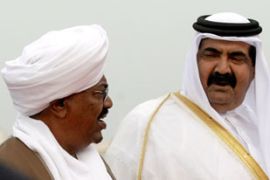Arab summit gets under way in Doha
Twenty-first Arab League summit opens with leaders hoping to ease regional rifts.

Al Jazeera’s Mohamed Vall, reporting from the summit venue, said that Arab leaders would likely discuss their responses to “the coming to power in Israel of the ultra-right politicians, the recent war on Gaza and the need to call for justice for those Palestinians who have been killed”.
“Also, the situation in Iraq, the situation in Afghanistan, the situation in Somalia – most of the things that touch the Arab world and the Islamic world as well,” he said.
Egyptian ‘snub’
While seventeen heads of state are attending the two-day gathering, there have been some notable abstentions.
| In depth |
|
|
Hosni Mubarak, the Egyptian president, has not shown up for the conference, sending instead a low-level delegation.
Abdul Bari Atwan, the editor-in-chief of the Arabic newspaper Al-Quds Al-Arabi, warned that Egypt’s snub could have repercussions.
“The Egypt ‘boycott’ of this conference could actually reflect in a negative way in the Palestinian reconciliation because there are major players here who might say ‘okay, if the Egyptians don’t like to attend this conference, why should we help the Egyptians’ initiative to achieve reconciliation among the Palestinian factions’,” he told Al Jazeera.
“This could reflect badly on the internal Palestinian situation, and would not give the right message to the right-wing Israeli government or the new American administration.”
Controversial guest
Ban Ki-moon, the UN secretary-general, was in attendance, despite the presence of Omar al-Bashir, the Sudanese president.
Al-Bashir, who had an arrest warrant issued against him by the International Criminal Court (ICC) three weeks ago for alleged war crimes in Darfur, flew into the Qatari capital on Sunday and was greeted by Sheikh Hamad bin Khalifa Al Thani, the emir of Qatar, on a red carpet at the Doha international airport.
Qatar is not a signatory to the ICC and therefore not obliged to arrest him.
Sudan has already rejected the decision of the ICC in The Hague to allow the prosecution of al-Bashir on war crimes charges and crimes against humanity.
Arab foreign ministers approved a draft declaration on Saturday urging the ICC to annul all its measures against al-Bashir. They also urged Arab states to reject the court’s ruling.
Delegates divided
Recent divisions have emerged largely over responses to Israel’s 22-day onslaught against the Hamas-ruled Gaza Strip at the beginning of the year.
Marwan Bishara, Al Jazeera’s senior political analyst, said that while al-Bashir had become the “star” of the summit simply by turning up, it would not eclipse the issue of Israel and the Palestinians.
 |
| Delegates gathered in Doha for the Arab League’s 21st summit |
“Especially this year – after the 2008 Arab summit declared that there is a danger in Israel and Palestine … and we had the war on Gaza, where apparently there were alleged war crimes committed and the Arabs were unable to respond to the very challenge in their midst.”
“They [Arab leaders] talk collectively but they act unilaterally, and hence they appear unable to put one front to Israel, to Europe, to America or to the International community.”
Divisions have also emerged over the growing regional influence of Iran.
Egypt and Saudi Arabia say that Iran is key to the strength of Hezbollah in Lebanon and Hamas in the Palestinian territories – groups which refuse to renounce armed action in the Arab conflict with Israel.
Iran and Syria say the policies of Hezbollah and Hamas are legitimate responses to Israel, which rejects returning Arab lands it seized in the 1967 Arab-Israeli war.

 Is the Arab League relevant?
Is the Arab League relevant?